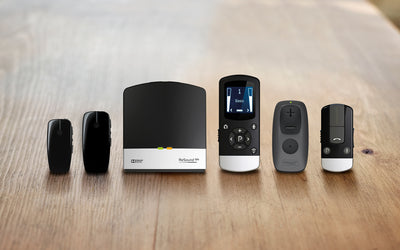By
Ailish Hamilton
In recent years, the connection between hearing loss and dementia is a topic of growing interest, with significant implications for public health. Furthering an increasing body of professional research investigating the intriguing connection, it has shed further light on this crucial topic. At Wholesale Hearing, we explore this fascinating correlation and delve into the ways wearing hearing aids might play a crucial role in mitigating the risk of cognitive decline.
Does Hearing Loss Cause Dementia?
Hearing loss is a significant risk factor for dementia, but it's not a deterministic cause.
While science is still unravelling the intricate tapestry of the brain, recent studies suggest a fascinating link between hearing loss and dementia. The numbers speak volumes: untreated hearing loss doubles the risk of dementia, triples it for moderate loss, and can increase to five times for severe cases. It's like your brain, struggling to decipher muffled whispers, gets overwhelmed and neglects other crucial tasks, potentially paving the way for cognitive decline.
Many individuals with hearing loss never develop dementia. Other factors also play a role in dementia risk, including genetics, lifestyle habits, and underlying health conditions. Addressing hearing loss through early intervention and potentially using hearing aids can improve communication, quality of life, and potentially benefit brain health.
How Does Loss of Hearing Link to Dementia?
The connection between hearing loss and dementia is a complex one that researchers are actively exploring.
While the exact mechanisms are still being unravelled, there are several possible explanations for this intriguing link:
- Brain Strain and Resource Depletion: When you have hearing loss, your brain has to work harder to decipher sounds and understand conversations. This "listening strain" can drain your cognitive resources, potentially leaving less energy for other tasks, including protecting against age-related brain changes linked to dementia.
- Social Isolation and Reduced Cognitive Stimulation: Hearing loss can lead to social isolation and decreased communication, limiting your exposure to new information and mental stimulation. This lack of cognitive engagement can contribute to cognitive decline and increase the risk of dementia.
- Shared Underlying Pathways: Some researchers believe that both hearing loss and dementia share certain underlying biological pathways, involving inflammation, vascular issues, or damage to specific brain regions. This shared vulnerability could explain why individuals with hearing loss are more susceptible to dementia.
- Sensory Deprivation and Neuroplasticity: Chronic hearing loss may lead to sensory deprivation in the auditory cortex, the brain region responsible for processing sound. This lack of sensory input can negatively impact neuroplasticity, the brain's ability to adapt and form new connections, which is crucial for cognitive health and dementia prevention.
- Emerging Evidence: Recent research suggests that treating hearing loss with hearing aids may actually slow cognitive decline and potentially reduce dementia risk, especially in individuals at higher risk due to other health conditions. However, more research is needed to confirm these findings and understand the precise mechanisms involved.
How Do Hearing Aids Help Prevent Dementia?
Addressing hearing loss through interventions like hearing aids has shown promise in mitigating cognitive decline. Expert studies have shown that hearing aids significantly reduced cognitive decline in older adults by 50%.
Think of your brain as a bustling city. Cars (words) zip through avenues (conversations), buildings (memories) line the streets, and the energy hums with constant activity. Now imagine muffling the car horns and blurring the street signs – that's what hearing loss can do to your brain's symphony. But here's the exciting part: researchers are investigating whether wearing hearing aids can be like tuning up the audio, potentially protecting against the shadows of dementia that can creep in with age.
By amplifying sound and bringing clarity to conversations, these tiny marvels can take the strain off your brain's processing power. Imagine them turning up the car horns and sharpening the street signs, allowing your mental traffic to flow smoother.
Conclusion
Dementia is a complex condition with multiple causes, and its progression varies based on the underlying factor. While evidence is promising, it's not a guarantee. So just like taking care of your physical health, addressing hearing loss and considering hearing aids can be a powerful step towards protecting your brain's vibrancy. Early detection and management of certain types of dementia symptoms may help improve the quality of life for affected individuals and their families. At Wholesale Hearing we provide professional care and aftersale support and the latest affordable hearing aids.
Key Takeaways:
- The link between hearing loss and dementia is complex and not fully understood. Other factors, like genetics and lifestyle, also play a role.
- Hearing aids are a valuable tool in promoting overall brain health and well-being. However, it is not a guaranteed shield against dementia.
- Early intervention is key. If you suspect hearing loss, don't hesitate to get a hearing test. Contact one of our audiologists, the sooner you address the issue, the sooner you can potentially reap the benefits of hearing aids.

Shop All Hearing Aids
Shop now
Shop Accessories
Shop now
Speak To Our Audiologists
Contact Us
